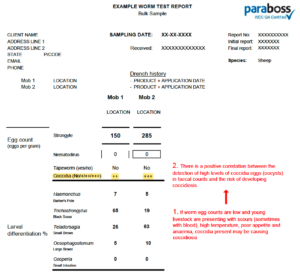Rainfall again persisting into the seasonally dry period in the southern states has given rise to concerns about coccidiosis outbreaks in lambs.
What is Coccidiosis?
Coccidiosis is a disease caused by a coccidian infestation within the digestive system of the animal and in severe cases can result in significant economic losses and can lead to death.1
High coccidian infestation increases the risk of Coccidiosis
The disease reduces feed consumption, body weight and feed efficiency, and may cause mortality of up to 24% in some cases without adequate prevention.6
Although the presence of coccidia in the digestive system does not always lead to clinical signs of coccidiosis, a high coccidian infestation in combination with stress and a depressed or undeveloped immune system increases the risk of coccidiosis developing. Coccidia are microscopic protozoan parasites known as Emeria that develop in the intestinal tract of sheep and cattle, and like worms, are transferred through faecal shedding.2
How do I know if my animals have Coccidiosis?
Symptoms of Coccidiosis
Clinical signs of coccidiosis are similar to Scour worm and Barber’s Pole worm and commonly include dark smelly scours that may include mucous and blood, ill thrift, anaemia, high temperature and sometimes death.3 However, it has been estimated that 95% of infected animals do not show clinical signs of coccidiosis. Subclinical coccidial infections can affect nutrient absorption and can result in increased economic loss.5
Young animals in high stocking densities are most at risk
Young animals in paddocks with high stocking densities or in confinement pens are most at risk of developing coccidiosis, particularly where paddocks and pens are wet. The wet conditions are ideal for coccidia reproduction, and the close contact with other animals can increase stress and assist in the spread of coccidia throughout the flock. Despite this, warm and damp conditions can see coccidia infestations develop in extensive grazing environments as well.
Coccidia infestation measured by worm egg counts
If young livestock are presenting with the above symptoms, it is recommended to submit faecal samples for a worm egg count to a reputable lab, the lab results usually highlight the presence of coccidia in their report (see figure 1). Intestinal round worms would most likely be the major culprit for these symptoms, however, in the event of low worm egg counts and high levels of coccidia present, animals may be suffering from coccidiosis.

Figure 1: Worm egg count report showing high levels of coccidia present and low worm pressure
How do I control Coccidiosis?
Reduce stress and good nutrition
Although many animals suffering from coccidiosis may recover when taken out of the stressful environment, put in a fresh paddock with adequate drainage and provided with good nutrition and water, some can suffer significant weight loss and death.4
Veterinary diagnosis
Veterinary consultation is recommended for diagnosis and treatment of infected animals.
Control coccidia populations with a mineral supplement containing Bovatec®
Like most issues involving animal health, prevention is by far better than a treatment. Attention to hygiene in confinement operations particularly, and good nutrition and animal health usually reduces coccidiosis risk by lowering transmission of coccidia and optimising immunity.2 The risk of coccidiosis development can also be reduced by offering livestock a mineral supplement containing a coccidiostat like Bovatec.
How does Bovatec work?
Bovatec aids in the reduction of faecal shedding of coccidia in sheep maintained in confinement, while the minerals, trace elements and vitamins within the supplement assist in boosting immunity, feed conversion efficiency and general animal health.
AusFarm Nutrition supplements can assist in controlling Coccidiosis
ANP supplements, StockMins-Lamb Finisher (for lambs at pasture), StockMins-Lamb Feedlot or StockMins-Lamb Grower (designed for intensive feeding) contain Bovatec and can aid in the reduction of faecal shedding of coccidia. Additionally, these supplements are fortified with other major minerals, vitamins and trace elements to help boost immune response, feed conversion efficiency and liveweight gain.
References
- S, Watt. B, Manning, L & Jordan, A., (2021). Coccidiosis Causing Sporadic Enteric Haemorrhage and Sudden Death in Unweaned Beef Calves. Australian Cattle Veterinarian, Vol 99 pp36-38.
- https://wormboss.com.au/other-occasional-parasites-of-sheep-and-goats/protozoa/
- https://www.msdvetmanual.com/digestive-system/coccidiosis/coccidiosis-of-goats
- https://www.crookwellvet.com.au/AnimalCare/Sheep/CoccidiosisBacterialScours.aspx
- Muirhead, S. 1989. Coccidiosis infections often go undetected in beef, dairy cattle. Feedstuffs. 15:87.
- Fitzgerald, P. R. 1975. The significance of bovine coccidiosis as a disease in the United States. Bovine Pract. 10:28.